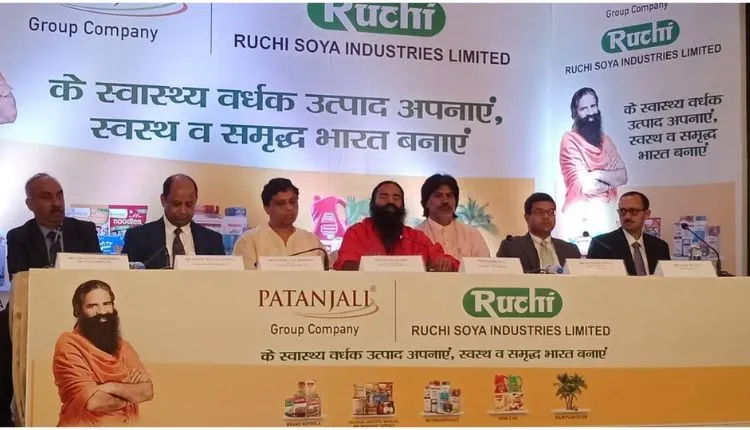Ruchi Soya, the Indian agribusiness and food processing company, is set to be renamed Patanjali Foods after the company’s board of directors approved the name change. The move comes as part of a wider strategy by Patanjali Ayurved, the Indian consumer goods company, to expand its reach in the food and beverage sector. Patanjali Ayurved is the parent company of Patanjali Foods.
The name change will be accompanied by a revamp of the company’s branding, with a new logo and visual identity set to be introduced. The move is expected to help the company differentiate itself in the crowded food and beverage market, where it faces stiff competition from established players.
The news was welcomed by investors, with the company’s stock surging by over 5% following the announcement. The name change is seen as a positive step for the company, which has struggled in recent years amid a difficult economic environment.
Patanjali Ayurved was founded by Baba Ramdev and Acharya Balkrishna in 2006, with the aim of promoting Ayurvedic products and traditional Indian medicine. The company has since grown rapidly, expanding into a wide range of consumer goods categories including personal care, home care, and food and beverage.
The company has been successful in capitalizing on the growing trend for natural and organic products, with a range of Ayurvedic products that appeal to health-conscious consumers. The company’s products are also known for their affordability, making them accessible to a wide range of consumers.
The move into the food and beverage sector is a logical next step for Patanjali Ayurved, as it seeks to expand its reach in the Indian market. The company already has a significant presence in the market, with a range of food products including spices, cooking oils, and instant noodles.
The name change to Patanjali Foods is seen as a way to leverage the company’s brand equity and build a strong identity in the food and beverage sector. The new name is expected to help the company differentiate itself from competitors, and build a strong association with natural and organic foods.
The move is also expected to help the company expand its product portfolio, with plans to introduce new food and beverage products in the near future. This is likely to include a range of Ayurvedic health foods, as well as traditional Indian snacks and sweets.
The food and beverage sector in India is a highly competitive market, with a wide range of established players competing for market share. However, there is also significant potential for growth, with rising incomes and changing consumer preferences driving demand for new and innovative products.
Patanjali Ayurved’s entry into the sector is likely to shake up the market, with the company’s focus on natural and organic products and its strong brand identity likely to appeal to health-conscious consumers. The company’s success in other consumer goods categories is also likely to help it gain a foothold in the market.
Overall, the move to rename Ruchi Soya as Patanjali Foods is a positive step for the company, and is likely to help it build a strong presence in the Indian food and beverage sector. With plans to expand its product portfolio and leverage its brand equity, the company is well positioned to capitalize on the growing demand for natural and organic foods in India.
In conclusion, the decision to rename Ruchi Soya as Patanjali Foods is a strategic move by Patanjali Ayurved to expand its presence in the Indian food and beverage market. With plans to introduce new products and leverage its strong brand identity, the company is poised for growth and success in the coming years.
FAQs:
1. What is Patanjali Ayurved’s focus on natural and organic products? Patanjali Ayurved has a focus on natural and organic products, as it seeks to promote traditional Indian medicine and Ayurvedic principles. The company’s products are known for their natural ingredients and affordability, making them accessible to a wide range of consumers.
2. What are the challenges facing the Indian food and beverage sector? The Indian food and beverage sector is a highly competitive market, with a wide range of established players competing for market share. Rising input costs and regulatory challenges also pose challenges for companies operating in the sector.
3. What is the significance of the name change to Patanjali Foods? The name change to Patanjali Foods is significant as it helps the company differentiate itself in the crowded food and beverage market, and build a strong association with natural and organic foods. It also reflects the company’s broader strategy to expand its reach in the food and beverage sector.

